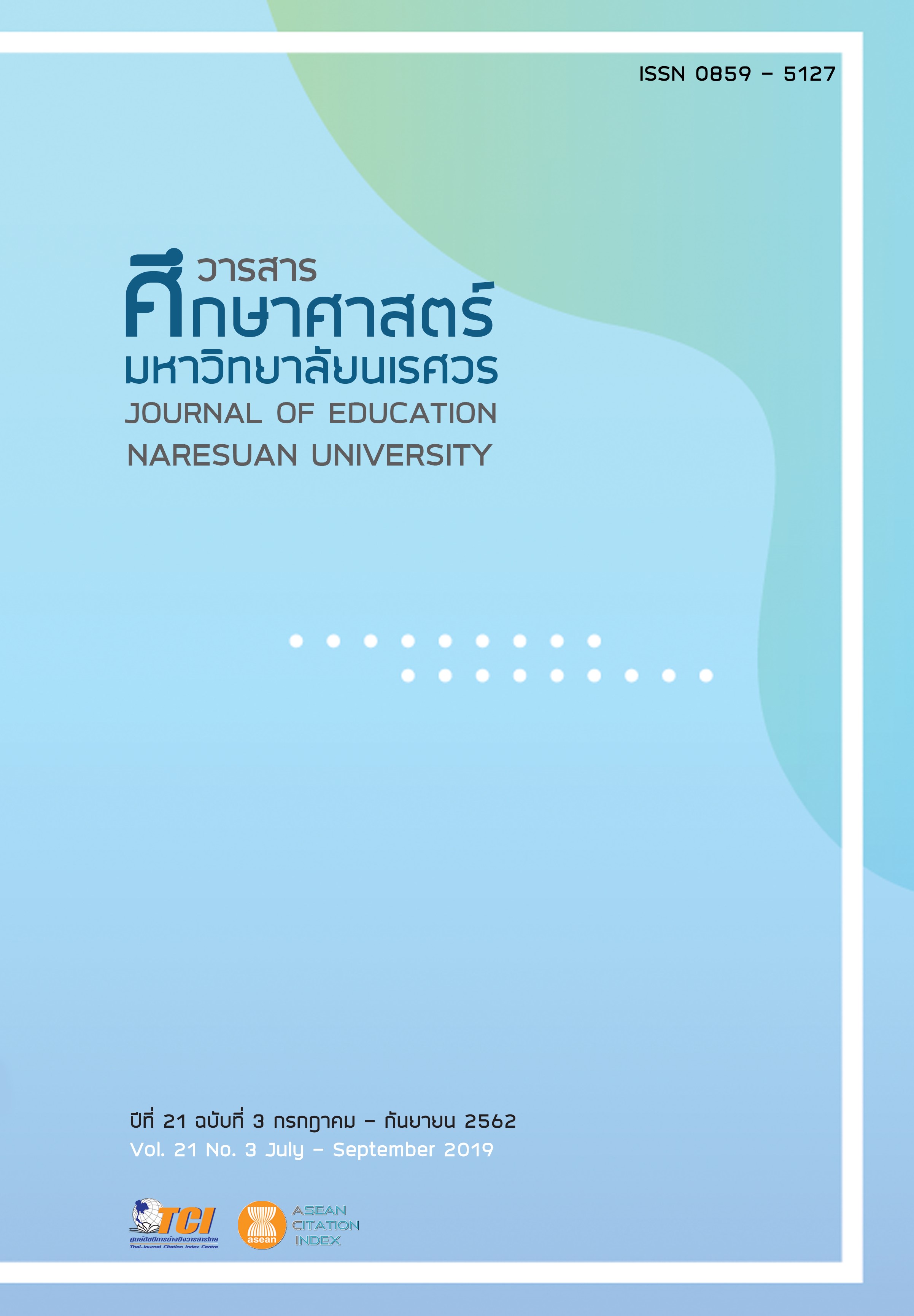MODEL ELICITING ACTIVITIES (MEAS): การจัดการเรียนรู้ทางคณิตศาสตร์ เพื่อพัฒนาความสามารถในการแก้ปัญหาสำหรับนักเรียนไทยในยุคการศึกษา 4.0 (MODEL ELICITING ACTIVITIES (MEAS): MATHEMATICAL LEARNING MANAGEMENT TO DEVELOP PROBLEM-SOLVING ABILITY FOR THAI STUDENTS IN EDUCATION 4.0)
Main Article Content
Abstract
การจัดการเรียนรู้เป็นกระบวนการสำคัญในการนำความรู้สู่การปฏิบัติในชั้นเรียนเพื่อให้นักเรียนมีความรู้ความสามารถตามมาตรฐานการเรียนรู้ สมรรถนะ และคุณลักษณะที่พึงประสงค์ตามหลักสูตรแกนกลางการศึกษาขั้นพื้นฐาน โดยยึดหลักว่าผู้เรียนสำคัญที่สุดและเชื่อมั่นว่าผู้เรียนทุกคนมีความสามารถในการเรียนรู้และพัฒนาตนเองได้ เมื่อแนวโน้มการพัฒนาประเทศมุ่งเน้นที่การขับเคลื่อนด้วยนวัตกรรมแล้ว การศึกษาของประเทศจึงจำเป็นต้องพัฒนาระบบการศึกษาให้สอดคล้องกับการพัฒนาอุตสาหกรรมในยุค “ประเทศไทย 4.0” ดังนั้น การจัดการเรียนรู้สำหรับนักเรียนไทยในยุค “การศึกษา 4.0” จึงควรเป็นการเรียนการสอนที่สอนให้นักเรียนสามารถนำองค์ความรู้ที่มีอยู่ทุกหนทุกแห่งบนโลกนี้ มาบูรณาการเชิงสร้างสรรค์ การคิดแก้ปัญหา และพัฒนานวัตกรรมต่าง ๆ เพื่อตอบสนองความต้องการของสังคม โดยเฉพาะการจัดการเรียนรู้ในสาระการเรียนรู้คณิตศาสตร์ที่เป็นพื้นฐานสำคัญของชีวิต โดยมีหัวใจที่สำคัญ คือ การสร้างกระบวนการคิดเพื่อการแก้ปัญหา บทบาทที่สำคัญมากของครูในยุคปัจจุบันนี้คือต้องไม่ละเลยกระบวนการคิดของนักเรียน ไม่มุ่งเน้นแต่ผลลัพธ์เพียงอย่างเดียว ดังเช่น การจัดการเรียนรู้แบบ Model Eliciting Activities (MEAs) เป็นแนวคิดการจัดการเรียนรู้ที่เน้นให้นักเรียนได้คิดค้นการสร้างตัวแบบเชิงคณิตศาสตร์เพื่อนำไปใช้ในการแก้ปัญหา และหาคำตอบร่วมกันเป็นกลุ่มจากสถานการณ์ปัญหาที่กำหนด ซึ่งเป็นสถานการณ์ที่นักเรียนสามารถพบได้จริงในชีวิตประจำวัน นักเรียนจำเป็นต้องใช้ความสามารถทางคณิตศาสตร์ในการแก้ปัญหา โดยมีกระบวนการคิดในการเชื่อมโยงระหว่างปัญหาในโลกแห่งความจริงสู่การแก้ปัญหาทางคณิตศาสตร์ด้วยกระบวนการของตนเอง เป็นการพัฒนานักเรียนเพื่อสร้างนวัตกรรมทางการคิดตามแนวคิดของ “การศึกษา 4.0”
MODEL ELICITING ACTIVITIES (MEAS): MATHEMATICAL LEARNING MANAGEMENT TO DEVELOP PROBLEM-SOLVING ABILITY FOR THAI STUDENTS IN EDUCATION 4.0
Learning management is an important process of applying knowledge to practice in classrooms in order to develop students’ knowledge, competencies, and desired characteristics based on learning standards of core curriculum in the basic education. It focuses on child-centered learning and the belief in students’ abilities that they can learn and develop themselves. Since the upward trend in Thailand development emphasizes the main driving force of innovation, Thailand’s educational systems should be developed along with industrial development in Thailand 4.0 era. To meet the society’s needs, Education 4.0 learning management should enable Thai students to access knowledge all around the world and apply it to creative integration, problem-solving and innovation development, especially in mathematics learning management that is essential for their lives and focuses mainly on development of students’ problem-solving thinking processes. Education 4.0 teachers should not overlook students’ thinking processes or focus solely on results. Model Eliciting Activities (MEAs) emphasizes on encouraging students to work in team and create mathematical models to find solutions for real-world problems. Students have to use their mathematical knowledge to solve problems by finding connection with real-world problems and coming up with their own mathematical problem-solving model. MEAs help develop students’ innovation and thinking skills in accordance with Education 4.0.
Article Details
The owner of the article does not copy or violate any of its copyright. If any copyright infringement occurs or prosecution, in any case, the Editorial Board is not involved in all the rights to the owner of the article to be performed.
References
2. Bransford, J., A. L. Brown, & R. R. Cocking. (2000). How people learn: Brain, mind, experience, and school. Washington, DC.: National Academy Press.
3. Chamberlin, S. A., & S. M. Moon. (2008). How does the problem based learning approach compare to the model-eliciting activity approach in mathematics? International Journal for Mathematics Teaching and Learning. Retrieved July 8, 2014, from https://www.cimt.plymouth.ac.uk/journal/default.htm
4. Fisher, D. H. (1987). Knowledge Acquisition Via Incremental Conceptual Clustering. Machine Learning, 2, 139-172.
5. Garfield, J., R. Delmas, & A. Zieffler. (2009). Inventing and testing models: Using model-eliciting activities. Retrieved May 10, 2015https://serc.carleton.edu/
6. Kaufman, A., S. Mennin, R. Waterman, S. Duban, C. Hansbarger, H. Silverblatt, S. S. Obenshain, M. Kantrowitz, T. Becker, J. Samet, & W. Wiese. (1989). The New Mexico experiment: educational innovation and institutional change. Academic Medicine, 64, 285-294.
7. Lesh, R., M. Hoover, B. Hole, A. Kelly, & T. Post. (2000). Principles for developing thought-revealing activities for students and teachers. In A. Kelly and R. Lesh. (eds.). Handbook of research design in mathematics and science education (pp. 113-149). Mahwah, New Jersey: Lawrence Erlbaum Associates.
8. Polya, G. (1957). How to solve it. Princeton, NJ.: Princeton University Press.
9. Schwartz, D. L., & Martin, T. (2004). Inventing to prepare for future learning: The hidden efficiency of encouraging original student production in statistics instruction. Cognition and Instruction, 22(2), 129-184.
10. Schwartz, D. L., Sears, D., & Chang, J. (2007). Reconsidering prior knowledge. In M. Lovett and P. Shah. (eds.). Thinking with Data. New York: Erlbaum.
11. Schwartz, D. L., Varma, S., & Martin, L. (2008). Dynamic transfer and innovation. In S. Vosniadou. (ed.). Handbook of Conceptual Change. Mahwah, New Jersey: Erlbaum.
12. Supap, W., & Naruedomkul, K. (2016). Mathematical word problems: students’ difficulties and recommended strategies. Journal of Education Naresuan University, 18(2), 264 – 275. [in Thai]
13. The Institute for the Promotion of Teaching Science and Technology. (2012). Mathematical skills and processes (5th ed.). Bangkok: Kurusapa Printing Ladphrao. [in Thai]
14. Thipkong, S. (2013). Problem solving mathematical skills (2nd ed.). Bangkok: Kurusapa Printing Ladphrao. [in Thai]

